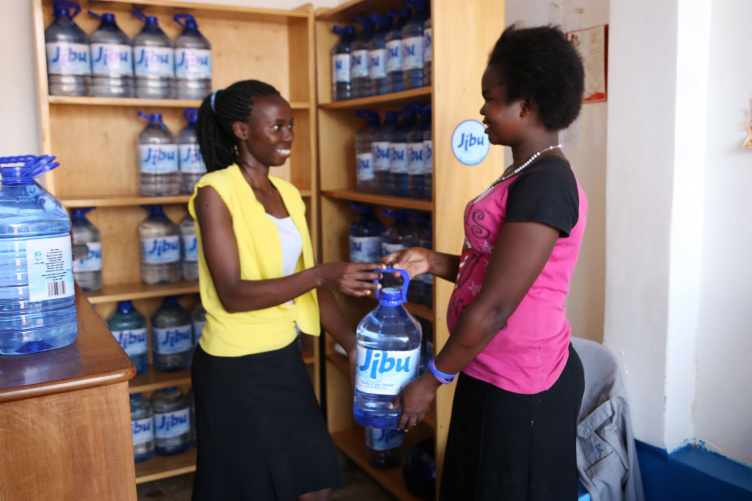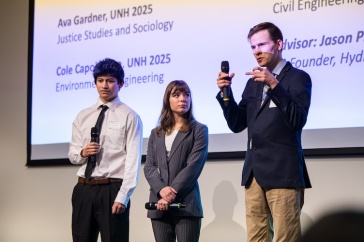
A woman purchases water from a Jibu franchisee.
Ray Kroc beheld beauty in a McDonald’s hamburger because it looked the same wherever it was served. Galen Welsch feels the same way about a cool draught of clean drinking water. The difference? Welsch is focused on places where affordable drinking water is hard to come by. That’s why he cofounded Jibu, a growing network of locally owned businesses that sell “radically affordable” drinking water to underserved people living in Kenya, Rwanda and Uganda.
Welsch wants to earn enough money to scale Jibu and be able to deliver more water to needy people, while also creating employment opportunities for would-be franchisees. So he turned to the one organization perfectly equipped to help him: the Social Sector Franchising Initiative (SSFI), a program of the Center for Social Innovation and Enterprise (CSIE), a joint venture between Paul College and the Carsey School of Public Policy. Paul College’s Rosenberg International Franchise Center is a key partner in the initiative.
Led by Bill Maddocks, clinical faculty member at the Carsey School, and Paul College clinical associate professor Fiona Wilson, the Social Sector Franchising Initiative helps build capacity in the emerging field of social sector franchising, while providing exciting research and engagement opportunities for UNH faculty and students.
“Social franchising applies commercial franchising best practices to providing life-saving or enhancing social goods and services,” said Wilson. “These organizations are primarily motivated by social impact rather than profit, and are represented across the developing world in healthcare, clean water and sanitation, clean energy, education and other sectors.”
The Social Sector Franchising Initiative is set up as an “accelerator” that connects aspiring social entrepreneurs, or “protégés,” with successful commercial franchising mentors, who come to UNH via the International Franchise Association, the global trade group with whom the Center for Social Innovation and Enterprise has a strategic partnership.
Wilson said for the project pilot they chose three social sector franchisers who were each at a different stage of maturity and complexity. These included Ignite Health Services from Nigeria, which will provide mobile health vans and clinics to bring safe and high-quality maternal health care to women in the greater Lagos area; Ziweto Agrovet Shops, a franchiser of small veterinary shops, which provide services for livestock farmers in Malawi; and Jibu.
In October 2016, protégés and mentors came to campus for a round table with senior leaders from the commercial and social franchise world (as well as faculty and select students) to establish a year-long game plan for collaboration. This included sending two UNH students to Africa in January to conduct field research on the social franchise projects. Their field data has been published online as living case studies of the partnerships.
“It was eye opening,” says one student, Ilona Drew, who earned a B.S. in Business Administration at Paul College in 2014 and is currently pursuing a Master’s Degree in Public Policy at the Carsey School. “I spoke with women who were accustomed to spending their whole days procuring water. When Jibu showed up, they were free to work and do other things.”
“Harnessing the commercial business model and using it to create good in the world is exciting. We’re the only such center in the U.S. doing this,” said Maddocks.
-
Written By:
Dave Moore | Freelance Writer



















































